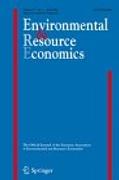Do PTAs with environmental provisions reduce GHG emissions? Distinguishing the effectiveness of climate-related provisions
14 juin 2022



Sorgho, Z., Tharakan, J. (2022, forthcoming) Do PTAs with Environmental Provisions Reduce GHG Emissions? Distinguishing the Role of Climate-Related Provisions. Environmental and Resource Economics. https://doi.org/10.1007/s10640-022-00707-9